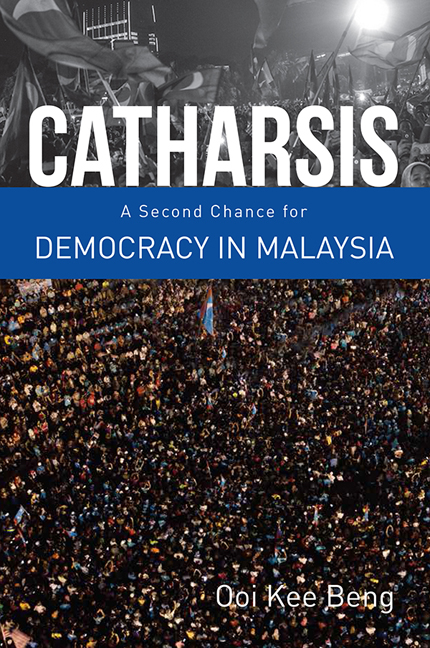Book contents
- Frontmatter
- Contents
- Foreword
- 1 Introduction – Malaysia's Future Is Redeemed
- Before Pakatan Harapan
- Before 9 May 2018
- 12 Racialising the Un-racialisable: What Is the Red Shirt Rally All About?
- 13 One Country's Merdeka Is Another's Damage Control
- 14 Malaysia – Where Politics Must Be Ethnically Inclusive and Exclusive at the Same Time
- 15 Is Malaysia at a Crossroads or in a Quagmire?
- 16 Unity Without Solidarity Sows Disunity
- 17 UMNO and Looking Back at History
- 18 Sarawak Forces Federal Opposition to Do Deep Soul-searching. But Can It?
- 19 By-elections Reveal New Malay Politics
- 20 Interview with Mahathir Mohamad: ‘People Must Be Able to Hold Their Heads Up.’
- 21 Malaysia Has to Start Re-examining Its Histories
- 22 Waves from US Probe into 1MDB May Turn into Tsunami
- 23 Seeking a New Formula to Unite Malaysia's Diversity
- 24 Time for Anwar to Accept Mahathir's Olive Branch?
- 25 Najib, Mahathir and the Timing of Malaysia's Polls
- 26 Excessive Governance Is Not Good Governance
- 27 Why Malaysia's Opposition Will Take to the Streets Again
- 28 Merdeka is About The Individual, Too
- 29 A Battle Between Malay Leaders Over Malaysia's Future
- 30 The Primacy of Political Economy in Asia
- With Mahathir at the Helm
- Beyond 9 May 2018
- About the Author
21 - Malaysia Has to Start Re-examining Its Histories
from Before 9 May 2018
Published online by Cambridge University Press: 12 February 2019
- Frontmatter
- Contents
- Foreword
- 1 Introduction – Malaysia's Future Is Redeemed
- Before Pakatan Harapan
- Before 9 May 2018
- 12 Racialising the Un-racialisable: What Is the Red Shirt Rally All About?
- 13 One Country's Merdeka Is Another's Damage Control
- 14 Malaysia – Where Politics Must Be Ethnically Inclusive and Exclusive at the Same Time
- 15 Is Malaysia at a Crossroads or in a Quagmire?
- 16 Unity Without Solidarity Sows Disunity
- 17 UMNO and Looking Back at History
- 18 Sarawak Forces Federal Opposition to Do Deep Soul-searching. But Can It?
- 19 By-elections Reveal New Malay Politics
- 20 Interview with Mahathir Mohamad: ‘People Must Be Able to Hold Their Heads Up.’
- 21 Malaysia Has to Start Re-examining Its Histories
- 22 Waves from US Probe into 1MDB May Turn into Tsunami
- 23 Seeking a New Formula to Unite Malaysia's Diversity
- 24 Time for Anwar to Accept Mahathir's Olive Branch?
- 25 Najib, Mahathir and the Timing of Malaysia's Polls
- 26 Excessive Governance Is Not Good Governance
- 27 Why Malaysia's Opposition Will Take to the Streets Again
- 28 Merdeka is About The Individual, Too
- 29 A Battle Between Malay Leaders Over Malaysia's Future
- 30 The Primacy of Political Economy in Asia
- With Mahathir at the Helm
- Beyond 9 May 2018
- About the Author
Summary
When studying humanity and its history, what one does is construct a narrative. And in that narrative, one distinguishes heroes from villains, outlines territories and peoples and differentiates steady trends from turning points.
Since different choices result in different stories, it is understandable that power-holders use whatever means they can to popularise storylines that they think serve them best. That is the nature of states. But what happens when the narrative leads consistently to negative outcomes?
In the case of Malaysia where quarrelling and squabbling now pass for discussion and debate, what we are often left with are disjointed ideas about what Malaysia is, what Malaysia was, what Malaysians are and what Malaysians are supposed to become. This would seem to have resulted from the over-politicisation of the national consciousness and over a long time.
Another way to describe this is to equate the Malaysian way of doing politics with the spraying of ink by the shrewd sotong. It sprays ink to confuse more than to contest. It does not wish you to know where it is going.
The problem is, if it does this too often and for too long, the sotong becomes as lost and confused as its enemy. It too does not know where it is going. The contest becomes everything; it becomes its own goal, it becomes a way of life. All are locked in a futile fight where even the winner recognises that his triumph is really a loss. There are no real winners.
But how is the country to break out into a new consciousness and attain a new way for Malaysians to relate to each other? Short of having an authoritarian figure forcing his will onto the whole of society, it would seem that sustainable change has to come from young adults who wish to break the tortuous trap in which the country is caught.
There is a tragic pathology involved. The diagnostician has to wonder over questions such as: How did UMNO, once a secular or at least non-religious party become a champion of religious politics?; How did the relative inter-ethnic harmony of the early decades end in the tensions in daily life that Malaysians now live with?; How has the acceptance of multiracialism as the basis of Malaysian life been overturned?; How did the cultured traditionalism of the Malays lose out to the harsh legalism of the Islamists?
- Type
- Chapter
- Information
- CatharsisA Second Chance for Democracy in Malaysia, pp. 75 - 78Publisher: ISEAS–Yusof Ishak InstitutePrint publication year: 2018

